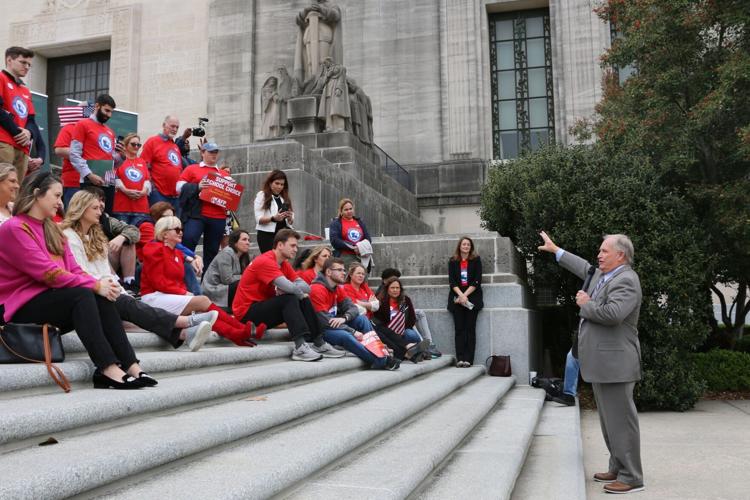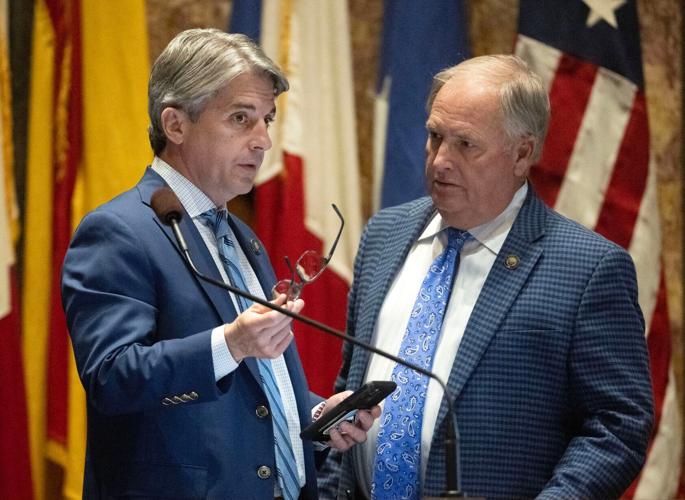Amid criticisms that the program would be disastrous for public education and create exorbitant costs for the state, the Louisiana Senate on Monday introduced a measure that pumps the brakes on Gov. Jeff Landry’s proposal to give families public money for private school.
On Monday, Sen. Rick Edmonds, R-Baton Rouge, proposed a complete overhaul of the plan he sponsored, which would put tax dollars into “education savings accounts,” or ESAs, that parents could spend on tuition. Instead of creating an ESA program, the revised Senate bill would require the state to first gather relevant information. Then the state board of education would be authorized, but not required, to set up the program.
The proposed overhaul of Senate Bill 313 comes as public school boards and superintendents have railed against Landry’s plan, saying it would divert needed tax dollars from public schools. Good government groups, citing high costs in other states where similar programs have been enacted, have said the state can’t afford the measure.
The changes also reflect Senate leaders’ vow to take a hard look at legislation that the new governor has sought to push through the Legislature at breakneck speed. The House passed its own ESA bill, which could cost taxpayers hundreds of millions of dollars per year, just two weeks after holding its first hearing on the measure.
“We're slowing it down,” Senate President Cameron Henry, R- Metairie, said last week. “We need a lot more information."

Senate President Cameron Henry said he wants to slow down bills to create "education savings accounts." On Monday, Sen. Rick Edmonds proposed changes to his bill that would do just that.
SB 313 in its original form had been held up in a committee, which must still vote on the amendments Edmonds proposed Monday. The Senate has not yet held a hearing on the House’s ESA bill, HB 745, which passed the House on April 8.
Both bills would create an ESA program, which represents a major policy change for Louisiana and a potentially huge new expense.
The program would replace the state’s voucher system, which covers private school tuition for low-income families who want to move their children out of struggling public schools. By contrast, the ESA program would offer tuition money to any family, even affluent parents whose children already attend private school.
In fall 2027, when any parent could apply for an ESA grant, the cost would reach about $258 million, according to a legislative analysis of Senate Bill 313. That amount is six times the $45 million the state spent last year on private school vouchers for low-income families.
Over time, the annual cost could soar to $520 million if the program is fully funded, according to an estimate by PAR Louisiana, an independent policy research group.
"Where does that money come from?” asked Rep. Matthew Willard, D-New Orleans. “We're looking at close to a $700 million deficit next year.”
ESA proponents have waved off concerns about the program’s price tag, saying the Legislature can contain costs by limiting how many students receive tuition money. But Senate leaders appear wary of promising grants to all families but only giving them to some.
“Once you start these programs, it's very hard to pull them back,” Henry told reporters earlier this month. “So we want to make sure that we don't give someone false hope and then have to take that back.”
Henry’s solution was to remove program details from the legislation and let the education department set the rules, including which families could participate and how much tuition money they would receive. Then the Legislature would later decide whether to fund the department’s program.
“The best way to control spending on it is to make sure the legislation itself is simplified,” he said at an April 11 event hosted by PAR. After the education department and state board of education design the program, then “we'll get to figure out how much money we actually want to appropriate.”
On Monday, the author of the Senate ESA bill seemed to do exactly what Henry had suggested. Edmonds proposed a package of amendments that would strip SB 313 of almost all details about how the ESA program would work.
Instead, the amendments call for the state education department to produce a report by Dec. 1 with data about the state’s public and private schools, including how many seats they have available and how students perform academically. The state board of education is “authorized” to use that data to develop an ESA program “with a focus on using limited resources in the most strategic and equitable way,” the amendments say.
Another big change: The amended bill would not replace the voucher program for low-income families, Edmonds told the Senate finance committee Monday. When asked whether the plan now is to run two programs, vouchers and ESAs, Edmonds said the details were still being finalized.
“It’s a work in progress,” he told the committee.
Edmonds did not respond to a request for comment Monday.
Erin Bendily, vice president for policy and strategy at the Pelican Institute for Public Policy, a Louisiana think tank that promotes school choice, said it was reasonable for the Senate to seek more information about the proposed ESA program. But she added that lawmakers should move with “urgency” to help parents meet their children's needs by offering ESAs, which can be used for private school tuition, special education services, tutoring and other education expenses.
“I think that's what families and voters expect us to do,” she said, “to be able to prioritize the needs that exist and be able to act to make that a reality as quickly as possible."
Tyler Bridges contributed reporting.



